Rome: The Complete Series Blu-ray Movie
HomeRome: The Complete Series Blu-ray Movie 
HBO | 2005-2006 | 2 Seasons | 1229 min | Rated TV-MA | Nov 17, 2009Movie rating
8.7 | / 10 |
Blu-ray rating
| Users | 4.8 | |
| Reviewer | 4.0 | |
| Overall | 4.3 |
Overview
Rome: The Complete Series (2005-2006)
| Epic | 100% |
| History | 88% |
| Drama | 83% |
| War | 73% |
| Period | 70% |
| Action | 49% |
| Romance | 1% |
Specifications
Video
Video codec: MPEG-4 AVC
Video resolution: 1080p
Aspect ratio: 1.78:1
Original aspect ratio: 1.78:1
Audio
English: DTS-HD Master Audio 5.1
German: DTS-HD Master Audio 5.1
French: DTS 2.0
Spanish: DTS 2.0
Polish: DTS 2.0
Subtitles
English, English SDH, French, German, Portuguese, Spanish, Danish, Dutch, Finnish, Greek, Norwegian, Polish, Romanian, Swedish, Turkish
Discs
50GB Blu-ray Disc
Ten-disc set (10 BDs)
Playback
Region free
Review
Rating summary
| Movie | 4.0 | |
| Video | 3.5 | |
| Audio | 4.0 | |
| Extras | 4.0 | |
| Overall | 4.0 |
Rome: The Complete Series Blu-ray Movie Review
HBO's short-lived, two-season Roman spectacle makes its high definition debut...
Reviewed by Kenneth Brown November 10, 2009Bitter public betrayals, rampant upheaval, endless wars, corrupt politicians, a neutered senate, countless claims to power, clashing religious ideals, volatile civil strife, a disgruntled populous, class struggles, unchecked wealth... sound familiar? No, I'm not about to deliver a diatribe on the decline of modern America, I'm of course referring to ancient Rome, a seemingly boundless empire that rose with a cry of "wreak havoc" and fell, some would argue within months of its inception, with a clatter of swords. Since the birth of our relatively young republic, its long-dead citizenry have whispered words of warning across the centuries; warnings any historian worth their Mediterranean sea-salt will tell you are startlingly relevant to our political ideology and ever-evolving cultural norms. It's these same, frankly frightening parallels that imbue Rome -- Bruno Heller, John Milius, and William J. MacDonald's critically acclaimed but short-lived HBO and BBC television series -- with such resonance and power. More significant and substantial than the historical soap opera some have labeled it, it's an oft-times compelling glimpse into an empire destined for dissolution and destruction.
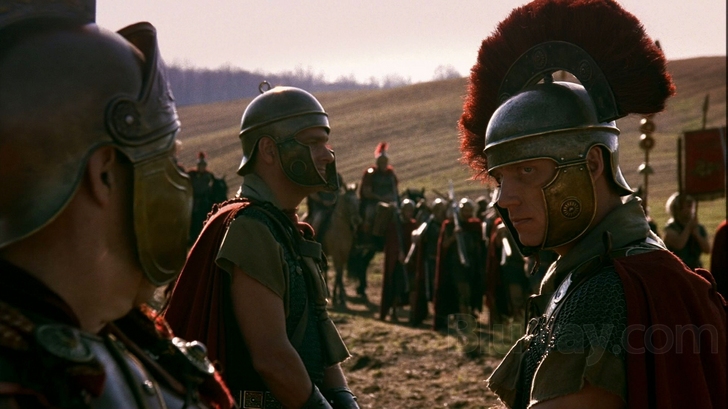
Loyalty and dishonesty come to a head in each character's life...
In its first season, Rome introduces its two chief characters: Titus Pullo (Ray Stevenson) and Lucius Vorenus (Kevin McKidd), a pair of battle-worn soldiers (plucked from Julius Caesar's written account of the Gallic Wars) who watch helplessly as their republic is transformed into an empire. Thankfully, Titus and Lucius aren't reduced to series C3PO and R2D2. Their experiences, however challenging and tragic, are intertwined with those of the entire nation, making both warriors fitting Everymen worthy of the attention and screentime they're awarded. As their slippery Caesar (Ciarán Hinds) begins to succumb to his own ego and mounting god complex, he swipes power from the Roman senate, much to the dismay of politicians Porcius Cato (Karl Johnson) and Marcus Tullius Cicero (David Bamber). He also inadvertently sets about the events that will lead to his downfall and inevitable murder. Elsewhere, Caesar's niece, the cold and manipulative Atia (Polly Walker), uses whatever means necessary to prepare her son Octavian (Max Pirkis) for the throne; Caesar's voice in the senate, Mark Antony (James Purefoy), desperately fights to support his friend and commander; and a moralistic young man named Marcus Brutus (Tobias Menzies), he of Et tu, Brute? fame, finds himself torn between king and country.
Season two focuses on the various powerplayers who vie for control in the wake of Caesar's assassination. After escaping the wrath of Quintus Pompey (Rick Warden), Mark Antony actively works to prevent Octavian (Simon Woods) from nabbing the throne, but eventually turns his attention toward greater pursuits; Pullo and Vorenus deal with their own personal strife, oftentimes struggling to survive the perils of Octavian's empire; Brutus and Cassius (Guy Henry) assemble a massive army, determined to unseat their new emperor; Atia withdraws into the comforts afforded her but finds she isn't as invincible as she once thought; and Egypt's unorthodox queen, the sly and charming Cleopatra (Lyndsey Marshal), arrives and begins to woo Mark Antony. Unfortunately, impending cancellation forced Heller and company to accelerate the story midway through its second season, and Rome lurches forward suddenly and unexpectedly as a result. Though assassinations, coups, and tremendous changes are explored with the same depth afforded a stone skipping across a pond, the series' creators are at least given the opportunity to tie up loose ends, complete character arcs, and end on something other than a cliffhanger. Had HBO granted a similar stay of execution to Carnivàle -- an inventive, mesmerizing, must-see series if there ever was one -- I wouldn't have to shed a tear every time I see Clancy Brown pop up on TV.
Rome remains a bold, breathtaking series for several reasons. At its heart, it's a psychological character study of the men and women who shaped world history as we know it; a taught, intense, mud-caked drama that shies away from myth and legend. Regardless of their power or influence, the series' characters feel real. Both their vulnerability and mortality are apparent, and I continually found myself at odds with conventional wisdom when attempting to cram any one of them into a preset archetype. Conflicted and confused, the characters -- Caesars and soldiers alike -- are reactionary creatures who aren't privy to historical hindsight. Their declarations carry weight and their decisions carry consequences, all of which allows the actors to fully submerse themselves in their roles, committing their talents to every act of depravity, violent misdeed, and debaucherous encounter their characters are forced to endure. It certainly helps that the series' directors, screenwriters and production design team seem thoroughly prepared for each challenge that comes their way. While their immense budgetary needs are partially to blame for the show's demise, they nevertheless infuse Rome with glorious sights and magnificent locales, granting every episode an authenticity more befitting a full-scale Hollywood production. Its this mix of visual spectacle, gore-spattered realism, and sharply written stories and characters that make Rome such an engrossing series.
That being said, there are a few problems (minor as they may be) that hold Rome back from greatness. In addition to the aforementioned acceleration that occurs as Season Two comes to a close, melodrama pops up on occasion (providing ample ammunition to critics who think the series is little more than a glorified soap opera); Roman sexuality is examined at gratuitous, at-times distracting lengths; Pullo and Vorenus are conveniently on hand whenever something big is about to go down; and the series' main female characters tend to be unscrupulous shrews, soft-skinned commoners, or foul-mouthed streetwalkers. Still, such shortcomings rarely interfere with the proceedings. Rome, brief hiccups notwithstanding, doesn't settle for easy answers or simple explanations. Its writers dig into history rather than recreating it, unraveling the psyches of the towering titans and lowly peasants who were crushed beneath the demands of a lumbering empire. Its stories force audiences to reflect on their own world, their own era, their own beliefs. Its themes ask tough questions and require legitimate reflection; its conclusions are as enigmatic as its quandaries. Had Rome been given the opportunity to thrive for another four seasons, I think we'd still be talking about the series around the proverbial water cooler.
Rome: The Complete Series Blu-ray Movie, Video Quality 
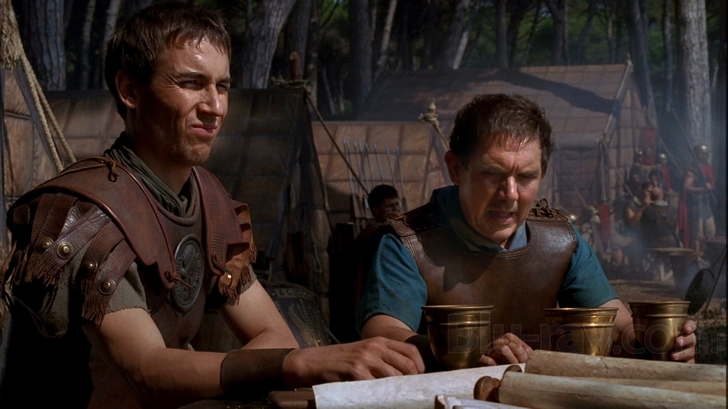
The Blu-ray edition of Rome features a decent 1080p/AVC-encoded transfer that captures the glory and grandeur of the empire, the grit and grime of its darkest recesses, and the tireless efforts its creators invested in every costume and locale. A fine veneer of grain lends each episode a filmic quality, effectively enhancing the earthiness of the production and the warm glow of the series' blood-stained palette. Primaries are lush and rewarding, blacks are deep and well resolved, and fleshtones, ever on display in Heller's oversexed empire, are attractive. Detail is also fairly impressive, showcasing the cracked cobblestones and crumbling ruins that dot the Roman countryside. Edge definition is generally sharp and natural, textures are competently rendered, and delineation, while often at the mercy of Marco Pontecorvo and Alik Sakharov's sun-soaked lighting and bottomless shadows, is adequately revealing. That being said, intermittent softness frequently invades the series -- grain and textures be damned, I could swear noise reduction has been applied to the image -- undercutting the merits of the presentation.
Spread comfortably across ten BD-50 discs, you'd think Rome's twenty-two episodes would have plenty of room to breathe. However, artifacting regularly appears in the series' senatorial scenes, poorly lit chambers, and dust-swept skies; noise spikes violently at times; and faint banding encircles elements like candlelight. Brutus and Cassius' second season clash with Octavian's army is particularly problematic, and shows evidence of the series' budgetary limitations and source issues. Luckily, instances of significant digital clutter -- be it macroblocking, aliasing, crush, or ringing -- are the exception rather than the rule. The majority of shots and episodes are clean and stable, sometimes making HBO's video presentation as intimate and extravagant as Heller and company's production design. Ultimately, despite its issues, those mourning the series' cancellation will be pleased with the visual wonders the set has to offer. At the very least, it bests its standard DVD counterpart and establishes itself as the version of Rome to own.
Rome: The Complete Series Blu-ray Movie, Audio Quality 
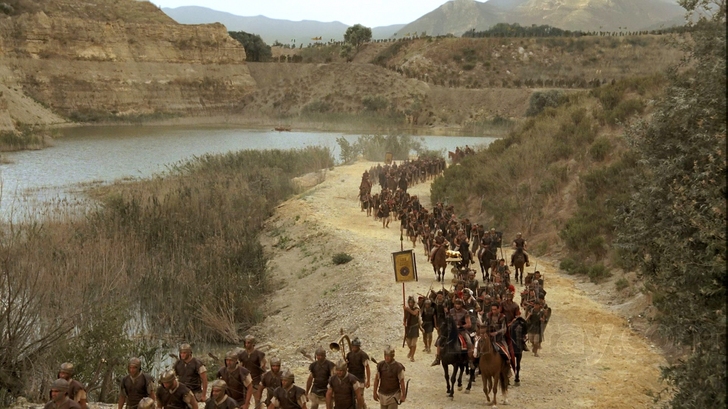
HBO's DTS-HD Master Audio 5.1 surround track is less prone to inconsistencies. With billowing, lossless fervor and notable reproduction of every soundscape detail, David Cohn's sound design and Jeff Beal's score have never sounded better. Dialogue efficiently inhabits the center channel, but often ventures into the surrounds to fill the crowded Roman streets and hostile Senate chambers with legions of crystal clear voices. Even the most chaotic battlefields fail to overwhelm any element of import. Some effects are a tad tinny and others fall flat, but the majority of the production comes through with heft and presence. Likewise, while screams are occasionally trampled by clashing weapons (and vice versa), the technical integrity of the soundfield isn't undermined or called into question. With immersive interior acoustics, involving environmental ambience, and enveloping war cries, the resonant halls and bloody fields of Rome sound as authentic as the show's creators intended. Moreover, pans are smooth, dynamics frequently steal the show, and clarity is quite capable. Directionality becomes a bit too stagey whenever historical melodrama rears its bloated head -- particularly in the latter half of the second season -- but is, more often than not, precise. As it stands, HBO's lossless audio track helps justify the set's price.
Rome: The Complete Series Blu-ray Movie, Special Features and Extras 
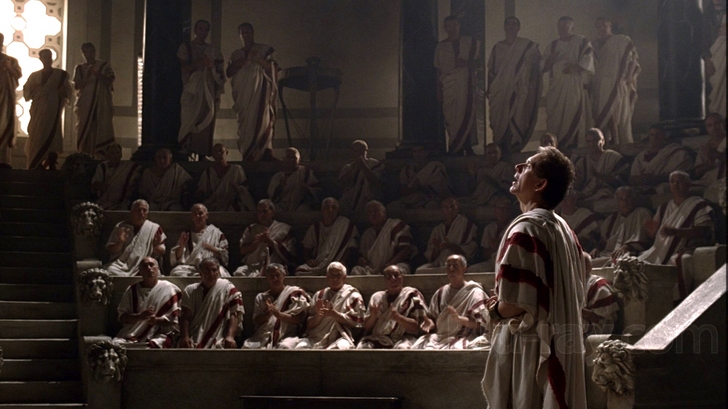
The Blu-ray edition of Rome: The Complete Series is housed within an attractive package. Nestled neatly within a sturdy outer sleeve, the set's case has been meticulously designed to resemble a leather-bound tome, complete with fourteen heavy cardboard "pages" that feature production photos, episode synopses, and a list of exactly what content fans will find on each disc. But while the discs themselves are housed comfortably in separate sleeves, one to a page, therein lies the set's biggest design flaw. To remove a disc, you have to pull it outwards, sliding the bottom surface of the disc across its accompanying cardboard page. Granted, the recessed slots are lined with glossy paper, but each disc still has to brush across the set's peripheral material when being removed. Thank the gods for scratch-resistant Blu-ray discs. It certainly isn't a deal breaker, but owners should take extra care when handling their set lest they crease one of the case's pages or, worse yet, scuff up one of the discs.
Please note: you can view a picture of the set -- and study its interior layout and design -- by accessing the rear cover image included at the top of this review, or in greater detail by visiting the product listing at Amazon.com.
- Audio Commentaries (Discs 1-6, 9-10): Writer/co-creator/executive producer Bruno Heller and co-producer/historical consultant Jonathan Stamp deliver the majority of the set's audio commentaries, digging their way through episodes like "The Stolen Eagle," "How Titus Pullo Brought Down the Republic," "Pharsalus," "Kalends of February," "Passover," and "About Your Father." Alas, their discussions are often so restrained and clinical that I quickly lost interest in what they had to offer. Heller spits out some interesting anecdotes about casting, script-writing, and production design, and the pair do manage to thoughtfully compare ancient Rome to its on-screen incarnation, but I continually found my attention drifting elsewhere. Stamp occasionally saves the day, sweeping in with passionate lectures about Roman history and the constant state of flux the empire faced, but Heller tends to drag things back down. While Diehard Rome fans will certainly get more out of their tracks than casual viewers, I have a feeling most listeners will be a bit dissatisfied with the bulk of their commentaries.
The set's other tracks are far more successful. Actor Ray Stevenson sits down to watch "The Ram Has Touched the Wall," but ends up dissecting the entire first season, describing Heller's on-set atmosphere, and discussing the series' lighting, locations, production design, characters, cast members, creative team and... well, everything. He even serves up a lively helping of historical facts. His is arguably the best commentary in the set, and the one I would suggest everyone begin with. Director Steve Shill dives into "Caesarion," touching on the actors' performances, his directorial sensibilities, and the techniques he employed to get the most out of every shot. His track is dotted with silence, but he's engaging whenever he speaks. For "Utica," director Jeremy Podeswa hones in on the tone, historical relevance, and impact of the series. While his is the chattiest and most complimentary track, it's also the most analytical and descriptive. Actor Kevin McKidd tackles "The Spoils," breaking down key sequences, character motivations, and plot points. Though he's more matter-of-fact that his fellow commentators, his track gains momentum as it rattles along, granting him ample opportunity to talk about the various dialects he and his castmates had to learn, the conflicts brewing between the characters, the challenge of shooting certain scenes, and the differences between the scripts and the final episodes. Were it not for his frequent and annoying lapses into silence, his commentary would be a fine match for Stevenson's.
Director John Maybury and actress Lindsay Duncan are a breezy, soft-spoken duo, unspooling "Death Mask," the process behind filming an episode, the subtleties of the storylines and characters, and other season-centric topics. Likewise, executive producer John Melfi and director Carl Franklin produce a spirited track for "A Necessary Fiction" in which they chat about historical Egypt, its incorporation into the series, Franklin's staging of several scenes, the actors and their performances, and the themes that dominate the show's second season. Their conversation is personable, effortless, and incredibly informative, filling in some of the production gaps left by Heller and Stamp. Last but certainly not least is James Purefoy's "No God Can Stop a Hungry Man" commentary. He describes what's happening on-screen far too often, but he also chews through the episode and series at large, injecting some wry humor and plenty of dense information into the proceedings. - Interactive Bloodlines (All Discs): HBO has created an interactive pop-up interface that provides bios and reveals connections between the men and women of Rome. Unfortunately, it's a rather simplistic, text-based addition that few will use.
- All Roads Lead to Rome (All Discs): Each episode also includes a somewhat remedial trivia track peppered with basic historical facts and production tidbits. However, like the discs' "Interactive Bloodlines," they're such barebones bonuses -- especially when compared to the engrossing Picture-in-Picture tracks featured on the Blu-ray edition of Band of Brothers -- that most viewers will skip them altogether.
- Friends, Romans, Countrymen (Disc 1, SD, 11 minutes): A clip-heavy EPK that introduces and examines the many characters of Rome. It's heavy on plot synopsis and base analysis, but makes succinct work of the first season's themes, heroes, soldiers, women, and storylines.
- The Rise of Rome (Disc 1, SD, 24 minutes): This behind-the-scenes documentary is far more extensive and revealing, yet still occasionally suffers from rampant self-promotion. Regardless, it covers the costumes, sets, props, and design decisions of the series' first season in great length, as well as the countless hours and hard work that produced such elaborate, yet realistic results. Actors, creative heads, and technicians are on hand to provide their thoughts, making this one of the more inclusive and informative features in the set.
- Shot X Shot (Disc 4, SD, 23 minutes): Entire documentaries aren't usually devoted to a single scene, but when it involves as much spectacle and psychological nuance as Caesar's turning point, it certainly deserves it. Key members of the cast and crew offer their thoughts on director Alan Taylor's contributions, the tone of the sequence, the framing of several shots, and the planning that went into making it the successful scene it is.
- Shot X Shot, Gladiator (Disc 5, SD, 23 minutes): Another thorough "Shot X Shot" documentary focuses on a tricky gladiator battle, the weapons and armor crafted for the sequence, the composition of its shots, the scope of the sets, and the production team's practical and CG effects.
- When In Rome (Disc 5, SD, 23 minutes): An in-depth look at the historical accuracy of the series and its portrayal of Rome's religious practices, women, brutality, slaves, citizenry, culture, and political turmoil.
- A Tale of Two Romes (Disc 6, HD, 21 minutes): 753 BC, the date historians traditionally assign to the founding of Rome, is at the heart of this historical documentary. Stamp discusses the origin of the city's rivalries, the dangers faced by its citizenry, the empire's revolving-door of power, early clashes between the Jews and the Romans, and the vulgarity, brutality, and graffiti that filled the streets.
- The Making of Rome: Season II (Disc 8, HD, 23 minutes): This second season doc focuses on the differences between Rome's seasons, the series' new characters, and the expanding scope of the show.
- The Rise of Octavian: Rome's First Emperor (Disc 9, HD, 21 minutes): Stamp helms yet another historical overview, this one focused on Octavian, that mixes fact with production details to create an absorbing documentary.
- Antony and Cleopatra (Disc 10, HD, 15 minutes): Ditto on this featurette, a short but satisfying look at history's so-called greatest love story, the series' approach to Antony and Cleopatra's relationship, and the manner in which the creators worked to pay respect to the historical figures.
- Episode Previews, Season 1 (Discs 1-5, HD, 10 minutes): Brief ads for all twelve Season 1 episodes are presented in high definition, but each one has simply been upscaled from standard definition.
- Episode Previews, Season 2 (Discs 6-10, HD, 7 minutes): Commercials for all ten Season 2 episodes are presented with the same quality.
Rome: The Complete Series Blu-ray Movie, Overall Score and Recommendation 
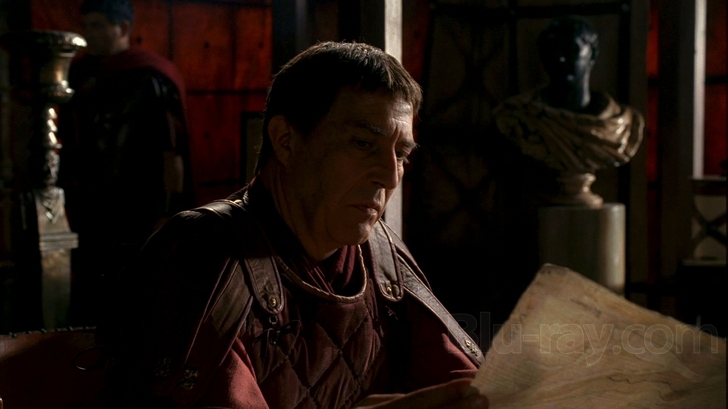
Is there a place on your shelf for a canceled series? One that only lasted two seasons and produced just twenty-two episodes? Absolutely. Especially when it's as staggering and elaborate as Rome. Sure, it has its fair share of minor issues -- most of which were brought on by its impending cancellation -- but it remains a well-conceived, smartly performed, exquisitely produced series worthy of your time and investment. The Blu-ray edition offers fans a decent (albeit problematic) video transfer, a meaty DTS-HD Master Audio track, and a wealth of special features. A lone design flaw will leave packaging nazis frothing at the mouth, but it's a small bother that shouldn't lead to any serious problems. HBO has produced a solid release that should make more than a few TV junkies happy this holiday season.
Other editions
Rome: Other Seasons
Similar titles
Similar titles you might also like

Spartacus 4K
1960

Kingdom of Heaven 4K
Director's Cut
2005

The Fall of the Roman Empire
1964

Flags of Our Fathers
2-Disc Special Edition
2006

Gods and Generals
Extended Director's Cut
2003

Spartacus: Gods of the Arena
2011

El Cid
1961

Master and Commander: The Far Side of the World 4K
2003

Spartacus: The Complete Series
2010-2013

Alexander Revisited
The Final Cut 4K | Collector's Edition
2004

Lawrence of Arabia 4K
60th Anniversary Limited Edition
1962

Troy
Director's Cut
2004

Saving Private Ryan 4K
Commemorative 20th Anniversary Edition
1998

Cleopatra
50th Anniversary Edition
1963

Generation War
Unsere Mütter, unsere Väter
2013

The Red Baron
2008

Ben-Hur
Fiftieth Anniversary
1959

The Messenger: The Story of Joan of Arc
1999

Glory 4K
1989

The Patriot
Extended Cut
2000


